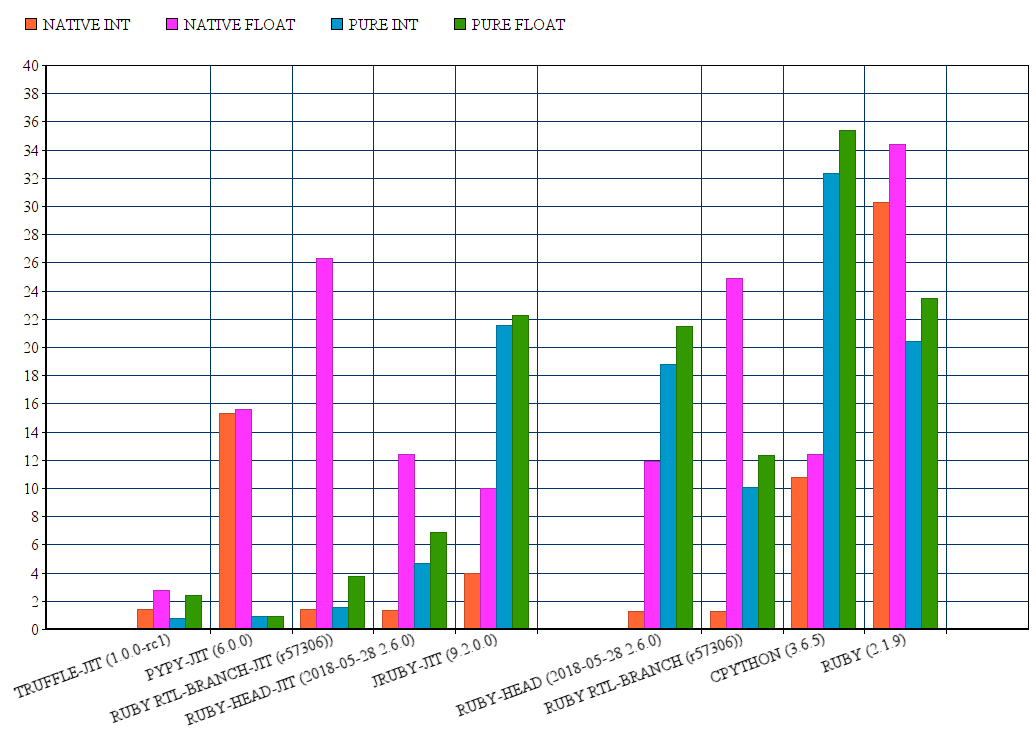[#86787] [Ruby trunk Feature#14723] [WIP] sleepy GC — ko1@...
Issue #14723 has been updated by ko1 (Koichi Sasada).
13 messages
2018/05/01
[#86790] Re: [Ruby trunk Feature#14723] [WIP] sleepy GC
— Eric Wong <normalperson@...>
2018/05/01
ko1@atdot.net wrote:
[#86791] Re: [Ruby trunk Feature#14723] [WIP] sleepy GC
— Koichi Sasada <ko1@...>
2018/05/01
On 2018/05/01 12:18, Eric Wong wrote:
[#86792] Re: [Ruby trunk Feature#14723] [WIP] sleepy GC
— Eric Wong <normalperson@...>
2018/05/01
Koichi Sasada <ko1@atdot.net> wrote:
[#86793] Re: [Ruby trunk Feature#14723] [WIP] sleepy GC
— Koichi Sasada <ko1@...>
2018/05/01
On 2018/05/01 12:47, Eric Wong wrote:
[#86794] Re: [Ruby trunk Feature#14723] [WIP] sleepy GC
— Eric Wong <normalperson@...>
2018/05/01
Koichi Sasada <ko1@atdot.net> wrote:
[#86814] Re: [Ruby trunk Feature#14723] [WIP] sleepy GC
— Koichi Sasada <ko1@...>
2018/05/02
[#86815] Re: [Ruby trunk Feature#14723] [WIP] sleepy GC
— Eric Wong <normalperson@...>
2018/05/02
Koichi Sasada <ko1@atdot.net> wrote:
[#86816] Re: [Ruby trunk Feature#14723] [WIP] sleepy GC
— Koichi Sasada <ko1@...>
2018/05/02
On 2018/05/02 11:49, Eric Wong wrote:
[#86847] [Ruby trunk Bug#14732] CGI.unescape returns different instance between Ruby 2.3 and 2.4 — me@...
Issue #14732 has been reported by jnchito (Junichi Ito).
3 messages
2018/05/02
[#86860] [Ruby trunk Feature#14723] [WIP] sleepy GC — sam.saffron@...
Issue #14723 has been updated by sam.saffron (Sam Saffron).
6 messages
2018/05/03
[#86862] Re: [Ruby trunk Feature#14723] [WIP] sleepy GC
— Eric Wong <normalperson@...>
2018/05/03
sam.saffron@gmail.com wrote:
[#86935] [Ruby trunk Bug#14742] Deadlock when autoloading different constants in the same file from multiple threads — elkenny@...
Issue #14742 has been reported by eugeneius (Eugene Kenny).
5 messages
2018/05/08
[#87030] [Ruby trunk Feature#14757] [PATCH] thread_pthread.c: enable thread caceh by default — normalperson@...
Issue #14757 has been reported by normalperson (Eric Wong).
4 messages
2018/05/15
[#87093] [Ruby trunk Feature#14767] [PATCH] gc.c: use monotonic counters for objspace_malloc_increase — ko1@...
Issue #14767 has been updated by ko1 (Koichi Sasada).
3 messages
2018/05/17
[#87095] [Ruby trunk Feature#14767] [PATCH] gc.c: use monotonic counters for objspace_malloc_increase — ko1@...
Issue #14767 has been updated by ko1 (Koichi Sasada).
9 messages
2018/05/17
[#87096] Re: [Ruby trunk Feature#14767] [PATCH] gc.c: use monotonic counters for objspace_malloc_increase
— Eric Wong <normalperson@...>
2018/05/17
ko1@atdot.net wrote:
[#87166] Re: [Ruby trunk Feature#14767] [PATCH] gc.c: use monotonic counters for objspace_malloc_increase
— Eric Wong <normalperson@...>
2018/05/18
Eric Wong <normalperson@yhbt.net> wrote:
[#87486] Re: [Ruby trunk Feature#14767] [PATCH] gc.c: use monotonic counters for objspace_malloc_increase
— Eric Wong <normalperson@...>
2018/06/13
I wrote:
[ruby-core:87301] [Ruby trunk Feature#14794] Primitive arrays (Ruby 3x3)
From:
muraken@...
Date:
2018-05-30 02:26:02 UTC
List:
ruby-core #87301
Issue #14794 has been updated by mrkn (Kenta Murata).
Use numo-narray or nmatrix for homogeneous numeric arrays.
https://github.com/ruby-numo/numo-narray
https://github.com/SciRuby/nmatrix
----------------------------------------
Feature #14794: Primitive arrays (Ruby 3x3)
https://bugs.ruby-lang.org/issues/14794#change-72296
* Author: ahorek (Pavel Rosický)
* Status: Open
* Priority: Normal
* Assignee:
* Target version:
----------------------------------------
dynamic arrays in ruby can contain various object types:
```ruby
[1, 1.0, 'text', Object.new]
```
however if I create a primitive array, let say only with integers (very common case). It should be more efficient.
```ruby
[1, 2, 3]
```
let me show you an example. I have an array and I want to find a maximum. I can use a native method(:max) or a naive pure ruby implementation.
I expect that the native function will always be much faster because it’s written in C right?
```ruby
require 'benchmark/ips'
arr_int = Array.new(50000) { rand 10000 }
def max_ruby(arr)
max = arr[0]
size = arr.size
i = 1
while i < size
if arr[i] > max
max = arr[i]
end
i += 1
end
max
end
benchmark.ips do |x|
x.report('native') { arr_int.max }
x.report('pure') { max_ruby(arr_int) }
x.compare!
end
```
here's a comparsion chart of different ruby & python's runtimes (lower is better)

as expected on ruby 2.6, the native function was faster.
Let’s compare it if we use a JIT
native – no difference
pure ruby – sometimes even faster than native
It's because JIT can't do anything with native functions (inlining, type checks etc.). Native fuctions should be as fast as possible.
MRI implementation of rb_ary_max
https://github.com/ruby/ruby/blob/trunk/array.c#L4335
```c
for (i = 0; i < RARRAY_LEN(ary); i++) {
v = RARRAY_AREF(ary, i);
if (result == Qundef || OPTIMIZED_CMP(v, result, cmp_opt) > 0) {
result = v;
}
}
```
this is great for mixed arrays, but for primitive arrays it's quite ineffective. C compiler can't optimize it.
1/ unbox it if possible, don't dereference objects and load it in chunks
2/ if <=> is not redefined, we can use a simplier algorithm
3/ it’s a trivial example that can be written in SIMD #14328, there's even a special instruction for it https://software.intel.com/en-us/node/524201
C compiler can do it for us, but this metod it too complex for auto-vectorization and the data type isn't known during compile time.
Array max is just an example, but the same strategy could be applied for many other methods.
I found a great article about it, check it out.
## http://tratt.net/laurie/research/pubs/html/bolz_diekmann_tratt__storage_strategies_for_collections_in_dynamically_typed_languages/
I think this feature could speed-up real ruby applications significantly and it shouldn’t be very hard to implement. We also don't have to change ruby syntax, define types etc. No compatibility issues.
--
https://bugs.ruby-lang.org/
Unsubscribe: <mailto:ruby-core-request@ruby-lang.org?subject=unsubscribe>
<http://lists.ruby-lang.org/cgi-bin/mailman/options/ruby-core>